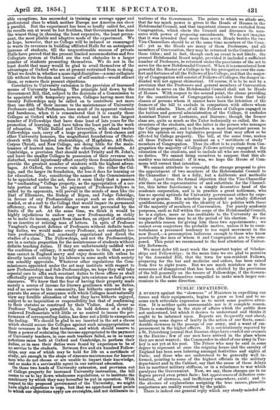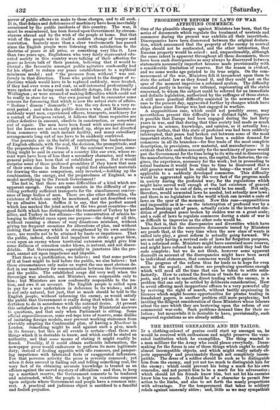PUBLIC IMPATIENCE.
A serruntra against the " slowness " of Ministers in expediting our forces and their equipments, begins to grow so loud and to as- sume such articulate expression as to merit some positive atten- tion. It is neither suite unreasonable nor is it complete reason. There is something in the state of affairs which the public does not understand, but which it desires to understand and thinks it ought to be informed upon. Reports are frequently cast about, indicating some degree of laxity in the action of our fleets, consi- derable slowness in the passage of our army, and a want of em- pressement in the higher officers. It is ostentatiously reported by a St. Petersburg journal that Russian ships have evaded our cruisers in the Euxine ; few of our men have arrived in the place where they are most wanted ; the Commander-in-chief of our array in Tur- key is not yet at his post. The Prince who may be said in some degree to represent at once the reigning house and the cavalry of England has been seen loitering amongst festivities and sights at Paris ; and those who are understood to be generally well in- formed, pointing to some of the highest officials in the military department and in the Cabinet, say that the cause of these delays lies in martinet military stiffness, or in a reluctance to war which
daralyzes the Government. Now, we say, these charges are in no egree proved even prima facie ; but appearances of defective com- bination, of slowness, and inefficiency somewhere, exist; and in the absence of explanations assigning the true causes, plausible conjectures are readily received by the public.
There is indeed one general reply which any steady-minded ob-
server of public affairs can make to those charges, and to all such. It is, that delays and deficiencies of machinery have been inevitably occasioned by the public incidents of this country. The war, it must be remembered, has been forced upon Government by circum- stances abroad and by the wish of the people at home. But that wish of the people was in itself a sudden change of temper and conviction. Scarcely more than a clear twelvemonth has passed since the English people were listening with satisfaction to the doctrine of peace at all price, or something very like it. Less than two years ago, Englishmen who very fairly represented edu- cated society in this country were talking of their affection for peace as lovers talk of their passion, believing that it would be eternal ; the favourite amongst public agitators confessedly had for his object to reduce our peace establishment to a mythical minimum model ; and " the pressure from without " was uni- formly in that direction. Those who pointed to the danger of re- ductions which would have to be replaced suddenly, were treated, if they had ever worn a red coat, as self-interested professionally ; were spoken of as being sunk in soldierly dotage, like the Duke of Wellington ; or were accused of making difficulties which could not be really in store for us. Our own journal had to encounter some censure for foreseeing that which is now the actual state of affairs. " Reduce ! disarm ! dismantle ! " was the cry down to a very re- cent period ; and when the public desires a war, and Ministers as suddenly want men, experienced officers, transports, machinery for a contest of European extent, it follows that those requisites are either defective in amount, obsolete in construction, or somewhat out of repair. The men have been found with unexpected ease; but the horses are not so easily picked up, ships are not diverted from commerce with such instant facility, and many subsidiary arrangements long out of use have to be suddenly contrived.
Our journals are in the habit of contrasting the backwardness of English officials, with the zeal, the decision, the promptitude, and the preparedness of the French. If the contrast were just, some- thing might be said in excuse of a country like our own, whose re- cent wars have been of less than a secondary character, and whose general policy has been that of established peace. But it would surprise some of those professed grumblers if they knew that men of their own class in the French capital find abundant materials for drawing the same comparison, only inverted,—holding up the combination, the energy, and the preparedness of England, as a model mortifying to the French Government!
The fact is, that there are some difficulties of a kind which are apparent enough. One example consists in the difficulty of pro- viding perfectly sufficient transports for the simultaneous convey-
ance of bodies of men. There are also other difficulties, the existence of which can only be mentioned, and not described even by an allusive hint. Suffice it to say, that the perfect sword which has marked the joint action of the two great countries—the good faith which has distinguished the treatment of Turkey by her allies, and Turkey in her alliance—the concentration of armies be- longing to different races upon one purpose—the doing of all this, without running a chance of very disastrous mistakes, without giving too frequent occasions for alterations of plan, and without risking that harmony which is strengthened by its own continu- ance, are results not to be attained by haste or impatience. That the public, indeed, should feel impatient to strike a great blow, even upon an enemy whose territorial extension might give him some dullness of sensation under blows, is natural, and not discre- ditable. But Governments, especially in junctures like the pre- sent, cannot act upon impatience and impulse.
j
That there is a justification, we believe ; and that some portion of it at least might be laid before the public, we also believe : but these circumstances only make us regret the one most obvious de- fect in our machinery for communication between the Government and the public. The established usage did very well when the Sovereign was absolute, and Ministers were responsible only to him; but Ministers are now confessedly responsible to the na- tion, and owe it an account. The English people is called upon to pay for a war undertaken in deference to its wishes ; and it is not only natural, but just, that so much should be told to the English people, without informing the enemy, as would satisfy the public thaeGovernment is really doing that which it has un- dertaken to do in accordance with the national desire. At present this satisfaction is given to the public only by Ministerial answers to questions, and that only when Parliament is sitting. Some official superciliousness, some red-tape love of reserve, some dislike of imitating foreign models, may prevent working statesmen from slavishly adopting the Continental plan, of having a Itfoniteur in London. Something might be said against such a plsn, much in its favour; but this at all events is certain—that there are things which it is desirable to know, and which could be stated on authority, and that some means of stating it might readily be found. Possibly, if it could obtain authentic information, the
newspaper press would endeavour to perform its more legitimate instead nstead of feeding appetite with idle rumours, and pamper- ing impatience with fabricated facts or exaggerated inferences. For that perverse activity the press is severely censured; yet when it does succeed in finding out and telling something real, the very fact of its obtaining accurate knowledge is treated as an offence against the sacred mystery of officialism : and thus, to keep up a martinet reserve, the Government consents to be traduced and mistrusted, while the people is kept in vexatious suspense upon subjects where Government and people have a common inte- rest. A practical and judicious object is sacrificed to a fanciful and foolish prejudice.



























 Previous page
Previous page